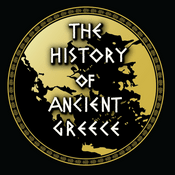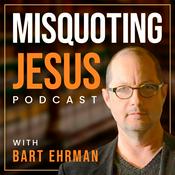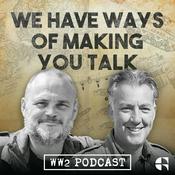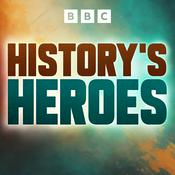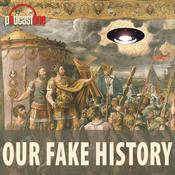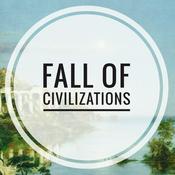223 episódios
- In this episode, we break down the composition of the Neo-Assyrian Army under the Sargonid dynasty (Tiglath-Pileser III, Sargon II, and their successors) and explain why Assyria’s battlefield dominance in the 8th–7th centuries BCE was not just “more men” or “more brutality,” but a specific military system built around logistics, organization, and a flexible combined-arms force.
You’ll learn what the core Assyrian infantryman looked like in practice: a general-purpose soldier equipped for multiple battlefield roles (spear, sword, bow, and shield), and why that versatility mattered for campaigns, garrisons, policing, construction, and sieges. We also examine how Assyrian military service worked, including seasonal call-ups, corvée-style obligations, land-grant service (ilkum), and the expectation of plunder—structures that helped sustain long campaigns without a fully modern “paid army” model.
From there, we move to the elite infantry (often associated with the royal guard) and the implications of lamellar armor in the Near Eastern heat. Armor, discipline, conditioning, and unit performance are treated as connected variables, not isolated trivia. We then reconstruct the iconic Assyrian shield-wall-and-archer system: tower shields, spear line behavior, the archer line directly behind the shields, and how this formation changes the psychology of spear-range fighting by making “safe distance” impossible.
The episode also covers the auxiliary/light infantry contingents organized along ethnic lines across the Assyrian Empire—why they were valued, how unit cohesion and veterancy can create tactical flexibility, and how these forces complemented the main line. Finally, we examine mounted forces during the Sargonid period: the maturation of true cavalry, the decline of chariotry into more limited roles, early spear cavalry, horse archery, equipment constraints before saddles and widespread horse armor, and how Assyria used mobility to exploit gaps, pursue breaks, and keep operational tempo high.
If you are interested in ancient warfare, the Bronze Age collapse aftermath, Neo-Assyrian history, Near Eastern military organization, imperial logistics, siege warfare, and the military reforms that shaped the ancient world, this episode is a deep, practical reconstruction grounded in how armies actually functioned on campaign and in battle.
Key topics and terms for search: Neo-Assyrian Empire, Sargon II, Sargonids, Tiglath-Pileser III, Sennacherib, Assyrian army, Assyrian infantry, Assyrian royal guard, lamellar armor, scale armor, tower shields, shield wall, Assyrian archers, composite recurve bow, ancient logistics, corvée labor, ilkum land grants, plunder economy, auxiliary troops, Itu’eans, Arameans, Hittites, Elamites, Urartu, cavalry origins, chariots to cavalry transition, combined arms in antiquity, ancient battle tactics, Near East military history, 8th century BCE, 7th century BCE.
Next episode preview: the campaign of 714 BCE against Urartu—one of the best documented operations of the ancient world, including intelligence, logistics, and royal correspondence.
I am also doing daily history facts again, at least until I run out of time again. You can find Oldest Stories daily on Tiktok and Youtube Shorts.
If you like the show, consider sharing with your friends, leaving a like, subscribing, or even supporting financially:
Buy the Oldest Stories books: https://a.co/d/7Wn4jhS
Donate here: https://oldeststories.net/
or on patreon: https://patreon.com/JamesBleckley
or on youtube: https://www.youtube.com/channel/UCCG2tPxnHNNvMd0VrInekaA/join
Youtube and Patreon members get access to bonus content produced when and as I have time. - In this episode of Oldest Stories, we step back from the famous conquests of the Neo-Assyrian Empire to ask a more fundamental question: what did ancient warfare actually look like on the ground, and how did the Assyrian army emerge from thousands of years of evolving combat traditions? Focusing on the world that produced the Sargonid military system, this episode examines the deep origins of organized warfare in Mesopotamia, from tribal raiding and Bronze Age spear lines to the psychological mechanics of close-order combat.
Rather than starting with siege engines, cavalry, or elite archers, this episode explores the forgotten core of ancient war: spear and shield formations, skirmishers, early missile troops, and the human fear dynamics that governed how battles were fought long before gunpowder. Drawing on archaeology, art, and written sources, it traces how stone-age raiding gave way to Bronze Age mass formations, how copper and bronze transformed lethality, and why settled societies developed fundamentally different military solutions than nomadic peoples.
The episode also explores why chariots dominated the Near East for centuries, how massed missile fire and mobility eventually broke their supremacy, and why the Iron Age battlefield became increasingly archer-centric. Along the way, it challenges modern assumptions shaped by reenactment, popular media, and strategy games, and argues that much of what we think we know about ancient melee combat is far more uncertain than commonly admitted.
By the time Sargon II inherits the Assyrian throne, the Near East is saturated with every major pre-gunpowder warfare paradigm at once: tribal raiding, mass infantry lines, chariot elites, archers, cavalry, and logistical warfare. This episode sets the stage for understanding why the Neo-Assyrian army was not simply brutal or technologically advanced, but uniquely adapted to a specific and highly complex threat environment.
This is the first part of a multi-episode exploration of the Assyrian military system, laying the conceptual and historical groundwork for a detailed examination of how the Sargonid army actually functioned in battle. If you are interested in ancient warfare, Assyrian history, Bronze and Iron Age combat, or the realities behind spear and shield fighting, this episode provides essential context.
I am also doing daily history facts again, at least until I run out of time again. You can find Oldest Stories daily on Tiktok and Youtube Shorts.
If you like the show, consider sharing with your friends, leaving a like, subscribing, or even supporting financially:
Buy the Oldest Stories books: https://a.co/d/7Wn4jhS
Donate here: https://oldeststories.net/
or on patreon: https://patreon.com/JamesBleckley
or on youtube: https://www.youtube.com/channel/UCCG2tPxnHNNvMd0VrInekaA/join
Youtube and Patreon members get access to bonus content about Egyptian culture and myths. - Today we attempt an immersive historical reconstruction of Dur-Sharrukin, the short-lived but astonishing capital built by Sargon II of Assyria in the late eighth century BCE. Set primarily in 706 BCE, this episode takes the listener on a guided tour of the city at the height of its splendor, using a fictional Urartian envoy as a narrative lens to explore what may be the most ambitious urban project of the ancient Near East.
Drawing closely on archaeological evidence, royal inscriptions, and comparative material from Assyria and Babylonia, the episode reconstructs the experience of approaching Dur-Sharrukin along the royal roads, passing through its immense fortifications, and moving from the regimented lower city into the elevated palace and temple complex. Along the way, it examines Assyrian logistics, deportation policy, urban planning, law courts, sacred gates, monumental reliefs, and the social reality of an imperial capital populated almost entirely by relocated peoples from across the empire.
Particular attention is given to the unprecedented scale and order of the city, its rigid grid layout, state-allocated housing, massive walls, and the palace platform crowned by the ziggurat of Nabu. The episode also explores the hydraulic engineering that made the upper complex possible, including early screw-pump technology that anticipates later traditions surrounding the Hanging Gardens of Babylon. Dur-Sharrukin emerges not merely as a capital, but as an ideological statement: a city designed to embody kingship, divine favor, and imperial domination in stone, water, and labor.
Although the central figure of Aramu is fictional, the city is not. The episode uses historical fiction as a disciplined tool to illuminate daily experience, perception, and scale in a way that conventional narrative history often cannot. It also reflects on the tragedy of Dur-Sharrukin’s fate, abandoned only months after completion following Sargon II’s death, and largely erased from living memory despite rivaling the great wonders of the ancient world.
This episode sets the stage for the next installment, which turns from the city to the engine that made it possible: the mature Assyrian army of the Sargonid period, examining its organization, equipment, tactics, and logistical systems in depth.
I am also doing daily history facts again, at least until I run out of time again. You can find Oldest Stories daily on Tiktok and Youtube Shorts.
If you like the show, consider sharing with your friends, leaving a like, subscribing, or even supporting financially:
Buy the Oldest Stories books: https://a.co/d/7Wn4jhS
Donate here: https://oldeststories.net/
or on patreon: https://patreon.com/JamesBleckley
or on youtube: https://www.youtube.com/channel/UCCG2tPxnHNNvMd0VrInekaA/join
Youtube and Patreon members get access to bonus content about Egyptian culture and myths. - Apologies for my voice and the lack of graphics. Been sick again and barely got this out today.
Episode 179 examines the founding, construction, abandonment, and rediscovery of Dur-Sharrukin (Khorsabad), the short-lived royal capital built by Sargon II of Assyria in the late eighth century BCE. The narrative begins with the history of early Mesopotamian excavation through the career of Paul-Émile Botta, whose 1843–1844 work near Mosul and Khorsabad helped inaugurate Assyriology and introduced Europe to monumental Assyrian palace architecture, relief sculpture, and royal inscriptions. The episode follows Botta’s unusual path into Near Eastern exploration, placing his expeditionary background within wider nineteenth-century networks of travel, collecting, and emerging archaeological method, and contrasts the French discoveries at Khorsabad with the subsequent British excavations associated with Austen Henry Layard at Kalhu and Nineveh.
From this modern historiographical prelude, the episode turns back to 717 BCE and reconstructs Dur-Sharrukin as an ideological and administrative project of empire. It discusses the city’s location, scale, labor regime, deportee settlement, and the programmatic symbolism of a purpose-built capital dedicated to the “true king.” Particular attention is given to the citadel complex—palace, temples, and ziggurat—alongside the logistical systems required to sustain rapid construction, long-distance procurement of materials, and the production of large-scale court art such as lamassu guardians and carved orthostats. The episode also engages changing archaeological interpretations of the site, including how later excavations and recent geophysical survey have revised older claims that the city was never fully completed or inhabited by demonstrating a substantial lower town and more complex occupational history.
The final section addresses the political and religious implications of Sargon II’s death in 705 BCE and the resulting abandonment of the city under Sennacherib, framing Dur-Sharrukin as a case study in the relationship between royal charisma, omen interpretation, and the volatility of capital cities in the Neo-Assyrian world. In doing so, the episode situates Dur-Sharrukin within broader Near Eastern patterns of state power, forced migration, monumental construction, and the archaeological afterlives of imperial projects.
I am also doing daily history facts again, at least until I run out of time again. You can find Oldest Stories daily on Tiktok and Youtube Shorts.
If you like the show, consider sharing with your friends, leaving a like, subscribing, or even supporting financially:
Buy the Oldest Stories books: https://a.co/d/7Wn4jhS
Donate here: https://oldeststories.net/
or on patreon: https://patreon.com/JamesBleckley
or on youtube: https://www.youtube.com/channel/UCCG2tPxnHNNvMd0VrInekaA/join
Youtube and Patreon members get access to bonus content about Egyptian culture and myths. - Sargon II of Assyria faces a crisis of legitimacy after a humiliating defeat, but transforms potential disaster into triumph through military genius and calculated brutality. This episode chronicles his desperate 720 BCE campaign from Mesopotamia to the Levant, where he perfects combined arms warfare and decimates Samaria so thoroughly that ten tribes of Israel vanish from history.
Following his controversial rise to power, Sargon must prove divine favor through victory or lose everything. Watch as he masters siege warfare with unprecedented tactical sophistication, deploying battering rams under coordinated covering fire to crack fortress walls that stymied his predecessors. His lightning campaign against Yahu-Bihdi's coalition demonstrates the Assyrian war machine at peak efficiency—mass deportations, public flayings, and systematic urban destruction become instruments of imperial control.
The episode explores Sargon's subsequent campaigns along Assyria's contested frontiers, from the fragmenting Mannean kingdom in the Zagros Mountains to rebellious Tabal under Phrygian influence. Detailed correspondence reveals the mechanics of ancient border warfare, including an elaborate ruse involving fake fortress construction to ambush Urartian raiders. We examine how Sargon manipulates succession crises, deploys intelligence networks, and uses overwhelming force—sometimes fielding armies larger than entire city populations—to maintain imperial dominance against Urartu, Phrygia, and internal dissent.
The narrative culminates with the mysterious fall of Carchemish, the last Neo-Hittite vassal, whose wealth funds Sargon's most ambitious project yet: a new capital city that will bear both his glory and an ominous curse.
I am also doing daily history facts again, at least until I run out of time again. You can find Oldest Stories daily on Tiktok and Youtube Shorts.
If you like the show, consider sharing with your friends, leaving a like, subscribing, or even supporting financially:
Buy the Oldest Stories books: https://a.co/d/7Wn4jhS
Donate here: https://oldeststories.net/
or on patreon: https://patreon.com/JamesBleckley
or on youtube: https://www.youtube.com/channel/UCCG2tPxnHNNvMd0VrInekaA/join
Youtube and Patreon members get access to bonus content about Egyptian culture and myths.
Mais podcasts de História
Podcasts em tendência em História
Sobre Oldest Stories
History and myth of the Cradle of Civilization, bronze age Mesopotamia, beginning with the dawn of writing. The show will cover the full history of Mesopotamia, from Gilgamesh to Nabonidas, a span of some 2500 years, with myths of heroes and gods, and tales of daily life peppered throughout. Sumer, Akkad, Old Babylon, Hittites, and Israel have all been covered in depth, current episodes get deep into the Assyrian Empire. New episodes every other Wednesday. Online at oldeststories.net.
Site de podcastOuça Oldest Stories, História FM e muitos outros podcasts de todo o mundo com o aplicativo o radio.net

Obtenha o aplicativo gratuito radio.net
- Guardar rádios e podcasts favoritos
- Transmissão via Wi-Fi ou Bluetooth
- Carplay & Android Audo compatìvel
- E ainda mais funções
Obtenha o aplicativo gratuito radio.net
- Guardar rádios e podcasts favoritos
- Transmissão via Wi-Fi ou Bluetooth
- Carplay & Android Audo compatìvel
- E ainda mais funções


Oldest Stories
Leia o código,
baixe o aplicativo,
ouça.
baixe o aplicativo,
ouça.











